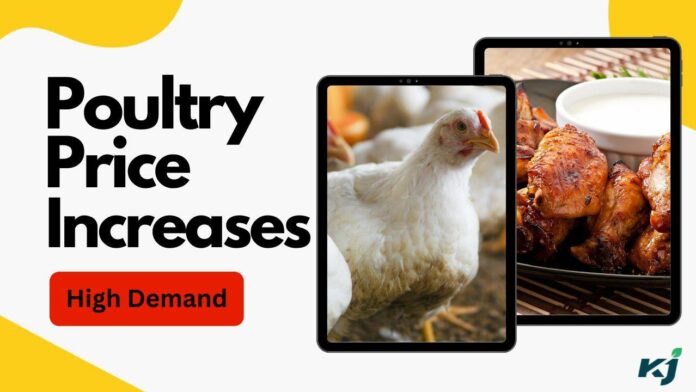
Poultry prices, which had seen a decline from April to August, have now started to rise again. The increase is attributed to the end of the Hindu religious periods of Shravan and Adhikamas, along with Sri Lanka’s increased import of eggs from India. Experts predict that demand for chicken and eggs will remain strong, leading to price increases in anticipation of the upcoming festive and wedding season in the October-December quarter.
Additionally, post-harvest prices of soy, a key poultry feed ingredient, are expected to rise, putting upward pressure on chicken and egg prices. To provide some context, this month, chicken prices at farm gates in Kolkata, Bengaluru and Delhi have soared to Rs 92-122 per kg, with retail prices ranging from Rs 250 to Rs 250 per kg, according to spot trading data. 260 per kg up to Rs. In contrast, farm gate chicken prices in July and August were around Rs 90-100 per kg, and retail prices were reported at Rs 180-210 per kg.
Increase in prices of eggs and chicken
Similarly, egg prices in Delhi, Kolkata, Mumbai and Bangalore have seen a rise, reaching Rs 540 per 100 pieces in wholesale markets and Rs 650 in retail outlets in September. In the last two months, the wholesale price of eggs ranged from Rs 415 to Rs 515 per 100 pieces, while the retail price was between Rs 520-550.
Broiler chicken meat prices remained stable immediately after Schwann. The price flexibility can be attributed to producers targeting their profit margins, strong consumer demand, and expectations for the upcoming October soybean harvest season, which may not yield favorable results. Poultry producers have already raised prices in anticipation of rising input costs.
Additionally, delayed and erratic rainfall in leading soybean producer Madhya Pradesh has resulted in wet soil conditions that are likely to adversely affect both the quality and quantity of the upcoming soybean crop. This has contributed to decisions by poultry producers to raise prices in anticipation of rising input costs.
Another influential factor is Sri Lanka’s decision in late August to significantly increase egg imports from India. This move has been taken to reduce price fluctuations due to local egg shortage. Sri Lanka has been relying on India to meet its local egg demand since March after a foreign exchange crisis affected animal feed imports and a shortage in poultry supplies.
However, it is worth noting that despite the recent rise in egg and chicken prices, this has not necessarily led to an increase in food prices. According to Devendra Kumar Pant, chief economist at India Ratings and Research, the 15-day Shradh and Navratri period may lead to a temporary cooling in poultry prices. He also said that food inflation is likely to come down from last month, mainly due to a sharp decline in tomato prices and some cooling in prices of other food items. Food inflation stood at 10.6 percent in July and 9.2 percent in August. Chicken and eggs account for 1.23% and 0.43% of the Consumer Price Index respectively.
First Published: 25 Sep 2023, 14:13 IST
